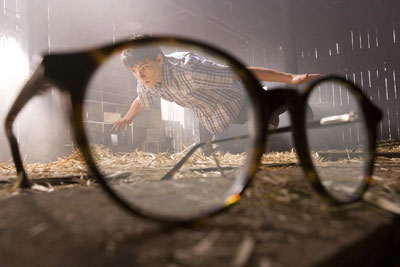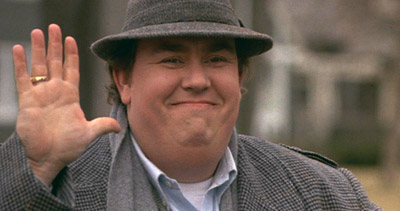 So yeah, Superman Returns.
So yeah, Superman Returns. I wanted to see it on the biggest screen that I could, because I never saw any of the Christopher Reeve films theatrically; Superman is one superhero who demands a large canvas, because he can contain the entire globe in his periphery. During the IMAX pre-show at the Paramount in Toronto we were informed that four sequences would be in 3-D, as well as that blinking icons would tell us when to put on our glasses. Fitting that these icons, laser-projected, turned out to be kryptonite-green, as their increasingly-dreaded appearance had a habit of weakening the movie's grip on the audience as people fumbled for their eyewear and giggled at the William Castle corniness of it all.
The first sequence to get the 3-D treatment, a flashback to Clark channelling his inner Peter Pan on the family farm, encapsulates the absurdity of transforming an image photographed for 2-D exhibition into a stereoscopic one: with Clark leaping neither towards nor away from the screen but instead across it, inappropriate emphasis is placed on the crops swaying in the foreground. And so instead of taking some sort of vicarious thrill from this joyous defiance of gravity, you're pushed further into the position of spectator. (This is especially detrimental considering the common complaint about Superman as a character is that it's impossible to put yourself in his shoes.) The 3-D becomes a tool of disengagement.
The airplane rescue, a significant portion of the helicopter climax, and the epilogue are similarly reconfigured for 3-D, which in the case of the first two renders unintelligible what is by most accounts superior montage filmmaking. I've said it before and I'll say it again: HD is not ready to replace 35mm, and the ghosting artifacts introduced in the transfer to celluloid--magnified enough as it is by the blow-up to IMAX--prove an insurmountable gremlin in the conversion to 3-D.
But it wasn't until the final sequence of Supes zigzagging around outer space that I realized why I have felt ripped off by IMAX 3-D, at least when it comes to live-action: rather than give the image more depth, it divides it into planes (which is why it works marginally better for stuff like The Polar Express, since depth in animation is inorganic to begin with), transforming the screen into one of those elaborate Victorian stages with cartoonish water waves on pulleys out front and a glittering sun in back. The irony of adding 3-D to IMAX is that it effectively dwarfs the image by making us hyper-conscious of scale; since it's hard to look simultaneously tangible and larger-than-life, that final solar system tableau evokes nothing so much as a science fair project with styrofoam planets.
Update (7/13)
Word to your mothersite: Walter caps a prolific week with reviews of A Scanner Darkly and the Running Scared DVD, while Travis slogs through all four discs of Chuck Berry: Hail! Hail! Rock 'N' Roll - The Ultimate Collector's Edition.
 On sale next month, THE FILM FREAK CENTRAL 2006 ANNUAL will include:
On sale next month, THE FILM FREAK CENTRAL 2006 ANNUAL will include:




